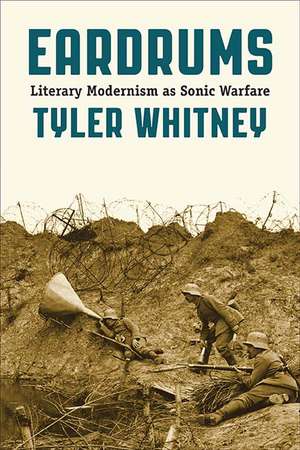Eardrums: Literary Modernism as Sonic Warfare
Autor Tyler Whitneyen Limba Engleză Paperback – 14 iun 2019
In this innovative study, Tyler Whitney demonstrates how a transformation and militarization of the civilian soundscape in the late nineteenth and early twentieth centuries left indelible traces on the literature that defined the period. Both formally and thematically, the modernist aesthetics of Franz Kafka, Robert Musil, Detlev von Liliencron, and Peter Altenberg drew on this blurring of martial and civilian soundscapes in traumatic and performative repetitions of war. At the same time, Richard Huelsenbeck assaulted audiences in Zurich with his “sound poems,” which combined references to World War I, colonialism, and violent encounters in urban spaces with nonsensical utterances and linguistic detritus—all accompanied by the relentless beating of a drum on the stage of the Cabaret Voltaire.
Eardrums is the first book-length study to explore the relationship between acoustical modernity and German modernism, charting a literary and cultural history written in and around the eardrum. The result is not only a new way of understanding the sonic impulses behind key literary texts from the period. It also outlines an entirely new approach to the study of literature as as the interaction of text and sonic practice, voice and noise, which will be of interest to scholars across literary studies, media theory, sound studies, and the history of science.
Eardrums is the first book-length study to explore the relationship between acoustical modernity and German modernism, charting a literary and cultural history written in and around the eardrum. The result is not only a new way of understanding the sonic impulses behind key literary texts from the period. It also outlines an entirely new approach to the study of literature as as the interaction of text and sonic practice, voice and noise, which will be of interest to scholars across literary studies, media theory, sound studies, and the history of science.
Preț: 330.37 lei
Nou
Puncte Express: 496
Preț estimativ în valută:
63.21€ • 66.18$ • 52.31£
63.21€ • 66.18$ • 52.31£
Carte disponibilă
Livrare economică 17-31 martie
Livrare express 28 februarie-06 martie pentru 27.46 lei
Preluare comenzi: 021 569.72.76
Specificații
ISBN-13: 9780810140219
ISBN-10: 0810140217
Pagini: 232
Ilustrații: 20 b-w images
Dimensiuni: 152 x 229 x 18 mm
Greutate: 0.32 kg
Editura: Northwestern University Press
Colecția Northwestern University Press
ISBN-10: 0810140217
Pagini: 232
Ilustrații: 20 b-w images
Dimensiuni: 152 x 229 x 18 mm
Greutate: 0.32 kg
Editura: Northwestern University Press
Colecția Northwestern University Press
Notă biografică
TYLER WHITNEY is an assistant professor of German at the University of Michigan.
Cuprins
List of Illustrations
Acknowledgments
Introduction: Writing Sound across the Modernist Divide: Phonography, Acoustical Embodiment, and the Tympanic Regime
1. Liliencron, Captain of the Nineteenth Century: Naturalism as Martial Phonography
2. Bringing the War Home: Tympanic Transductions from the Battlefield to fin-de-siècle Vienna
3. Drumming Literature into the Ground: Dada’s Tympanic Regime
4. Towards a Modernist Ear: Robert Musil and the Poetics of Acoustic Space
5. Into the Inaudible: Sound and Imperception in Kafka’s Late Writings
Conclusion: Nazi Soundscapes and Their Reverberation in Postwar Culture
Notes
Works Cited
Index
Acknowledgments
Introduction: Writing Sound across the Modernist Divide: Phonography, Acoustical Embodiment, and the Tympanic Regime
1. Liliencron, Captain of the Nineteenth Century: Naturalism as Martial Phonography
2. Bringing the War Home: Tympanic Transductions from the Battlefield to fin-de-siècle Vienna
3. Drumming Literature into the Ground: Dada’s Tympanic Regime
4. Towards a Modernist Ear: Robert Musil and the Poetics of Acoustic Space
5. Into the Inaudible: Sound and Imperception in Kafka’s Late Writings
Conclusion: Nazi Soundscapes and Their Reverberation in Postwar Culture
Notes
Works Cited
Index
Descriere
Eardrums contributes to contemporary discussions surrounding the historicity of listening and acoustical knowledge by examining a pivotal moment in the evolution of the ear and listening in German modernist literature and cultural production.
